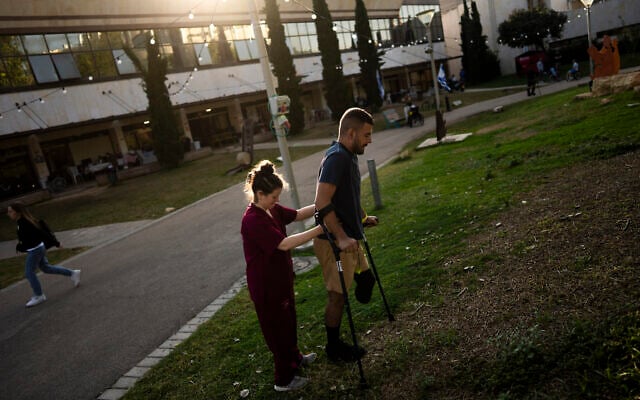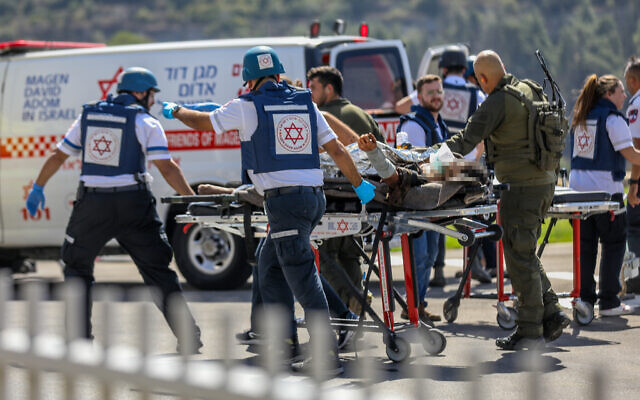



With Passover and the Israeli national holidays just around the corner, the upcoming weeks are expected to be an especially sensitive time for Israel Defense Forces personnel suffering from post-traumatic stress disorder, rehabilitation experts said in a Sunday briefing.
According to Defense Ministry Deputy Director General Limor Luria, who heads the ministry’s Rehabilitation Department, soldiers struggling with PTSD cite holidays and memorial days as especially straining, even more so during wartime.
This year, Passover, Holocaust Remembrance Day, Memorial Day and Independence Day all fall in April, exacerbating the risk of mental health decline.
Efrat Shaprot, the CEO of NATAL, an Israeli nonprofit providing psychological and emotional support to victims of war and terror, stressed the importance of raising awareness ahead of the holidays.
“We always see a rise in adversity during this period, certainly amid war,” she said.
Luria highlighted individuals lacking strong family ties as particularly at-risk and urged the public to reach out and offer support to anyone who may fall into that category.

During the briefing, the Defense Ministry provided a list of potential signs that at-risk individuals may exhibit, including sudden mood swings, irritability, and self-neglect.
According to the ministry, the best way to support someone in emotional distress is to listen without judgment, offer hope, and stay alert to changes in behavior. Specialists also recommended asking direct but compassionate questions, such as “Are you thinking about death?” to help start a conversation while also encouraging at-risk individuals to seek professional help.
The Rehabilitation Department offers a range of services, including a 24/7 call center, access to personal psychological care specialists, and a dedicated app called “The PTSD Guide,” which provides a variety of mental health resources.
Since Hamas’s October 7 onslaught, Luria said, the Rehabilitation Department has absorbed 16,500 injured soldiers, with nearly half of them being treated for PTSD. In comparison, the department was treating 62,000 wounded soldiers before October 7, only 25 percent of whom suffered from psychological injuries.

“We have very much simplified the referral process,” Luria said, adding that all one needs to do is sign into the Rehabilitation Department’s website to receive services.
However, Idan Kaliman, chairman of the IDF Disabled Veterans Organization, stressed that there is only so much the Rehabilitation Department and partner organizations can do without proper funding and resources.
“As long as the Rehabilitation Department continues to be understaffed,” preventable suicides as a result of military-related PTSD will continue to occur.
In January, when the IDF released statistics on its fatalities from 2023 to 2024, it reported a rise in suspected military suicides amid the ongoing war.

The number of suspected suicides among Israeli soldiers had risen sharply since the Hamas-led assault on October 7, according to the data published by the IDF. Since the start of the war, 28 soldiers were believed to have died by suicide. Previously, in 2023, before the attack, 10 such deaths were recorded.
By comparison, the IDF documented 14 suspected suicides in 2022 and 11 in 2021, underscoring the psychological toll of the ongoing war.
The IDF also noted that thousands of reservist soldiers have reportedly stepped back from combat roles due to mental stress. However, the military did not release additional data or elaborate further on the trend.
Last month, Israel held its first-ever International Rehabilitation Conference, entitled “Lifetime Partnership,” in which global experts convened to discuss recovery processes for injured security personnel.

While speaking at the event, Luria highlighted the Rehabilitation Department’s prioritization of immediate rehabilitation over bureaucracy, providing patients and their families with mental health support and other assistance without a need for medical committees.
The need for effective mental health treatment continues to grow, as the Rehabilitation Department estimated that it will be treating approximately 100,000 wounded personnel by 2030, half of whom are expected to experience PTSD.
According to IDF statistics published in February 2024, of around 3,000 soldiers in compulsory service or the reserves who were checked by the military’s mental health system since October 7, 82% returned to battle.
